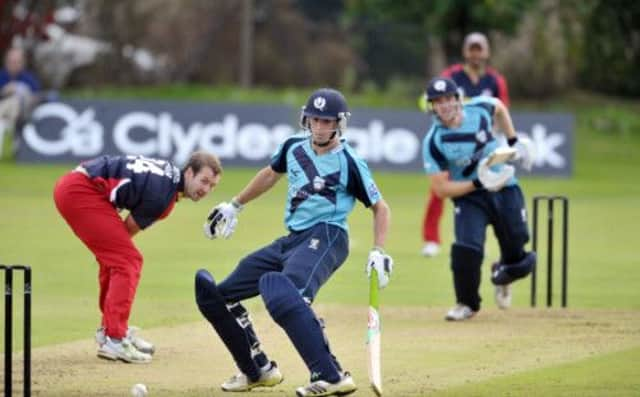Scottish Saltires play last game at Titwood


Ten years after Cricket Scotland created the Scottish Saltires to meet the demands of a brave new world, the team played their last game under grey skies at Titwood and its script unfolded according to type, for the third time in five days.
Callow Scots batsmen denied scoring opportunities by mean lines and lengths and perishing due to ill-timed adventure. County batsmen hitting deliveries for four that their hosts could only nudge to the infield.
Advertisement
Hide AdAdvertisement
Hide AdIn summary, full-time county players showing full-time and part-time Scotland players that there is a big difference between their respective abilities, showing them how modern one-day cricket is played. Skilled and well-paid operators from the shires seizing on every inaccuracy and moving without undue stress to a victory that was never in doubt, except for a brief period in the gloom when Messrs Duckworth and Lewis conspired against Lancashire.
And on the other side of the boundary rope, a two-figure crowd taking it all in with expressionless faces; burger bars under-utilised; pints drunk without cheer; pensive ground-staff standing on standby for the next shower; a pair of lovers huddling on a bench, perhaps remembering a day when there was romance on the field.
It wasn’t always this sterile, was it? Well, the ground-staff were always pensive, but otherwise no, it wasn’t.
There was, of course, the odd day like this back in 2003. Craig Wright’s team didn’t always look like equals. But for a cocktail of reasons – reduced ambition, synchronised retirements, a deliberate focus on giving youngsters a chance in an arena where there is no scope for “bedding in” – we have reached the point where the return does not justify the investment.
It was all so refreshing, so thrilling, at the outset. Players like Wright, Ian Stanger and Colin Smith had waited years for the chance to play as a unit every week and contradict the view that Scots couldn’t master the intricacies of England’s beloved summer game.
The players were unpaid, initially the team had no sponsorship and they went into combat with superstars without their superstar – Rahul Dravid missed the start of that first season. But they won games, all three of their first three completed games, and lost others heroically.
This season in the Yorkshire Bank 40, the Saltires have lost every game – this had never happened previously in ten league campaigns – and hardly any of them have been competitive. In previous troughs, wins would dry up but then one would appear out of the blue, spreading hope. In 2007, with two good Aussies and Ryan Watson in his prime, the Saltires won three in a row.
However, that was the year the stock of both the Saltires and Scotland started its deep and hitherto irreversible descent. It is sad to report that the county-cricket brand will be stronger for the absence of its Caledonian branch.
Advertisement
Hide AdAdvertisement
Hide AdThere were a few signs yesterday of creative resistance. After a clatter of wickets left the hosts looking like they would not use up their overs, home No 11 Calvin Burnett introduced Lancashire to his big Arbroath arms. And when Lancashire came out to bat, Michael Leask opened the bowling with off-spin. Good off-spin, too.
It was watchable for a while. The Lancashire radio commentators became animated when the players returned from a rain break, and Preston Mommsen set an effective trap to get rid of Stephen Moore, but Ashwell Prince didn’t want to be associated with the kind of ignominy Lancashire experienced when they lost three times in a row to the Saltires at Old Trafford.
That sequence has to go down as a freak occurrence. The truth is that for all the lessons Scots have learned from playing against and sometimes alongside the elite in this decade, Majid Haq is the only one who has consistently had an influence on games. And even Haq has never quite rekindled the magic of 4-36 on day one at Durham.
So what now? For a start resources can be directed solely at Scotland, which can’t be a bad thing. There is talent around. Wright’s under-19s have just qualified serenely for a World Cup, and the seniors have three very big games coming up in September: the quadrennial joust with Australia at Grange and two pivotal World Cup qualifiers in Ireland.
Diehards will miss the shires, but I am not sure how many of the whipping boys in blue will. If Scotland can qualify for the 2015 World Cup, and do something when they get there, it will reverberate far more loudly and do much more for the game than any number of victories in the CB40, YB40, NUL, NCL or the C&G Trophy. Ireland never really bought into these competitions and gave up on being a country that lost to counties every week in 2009. They don’t regret it.